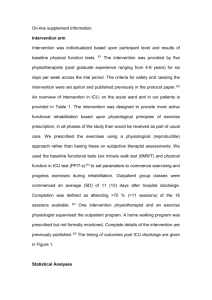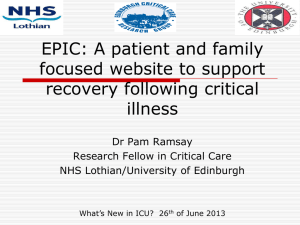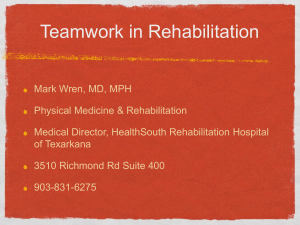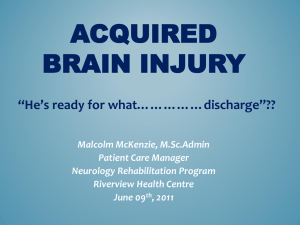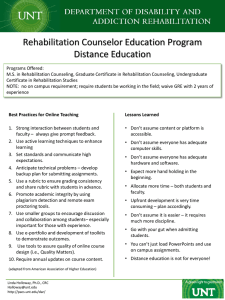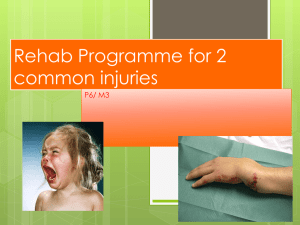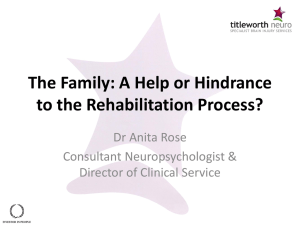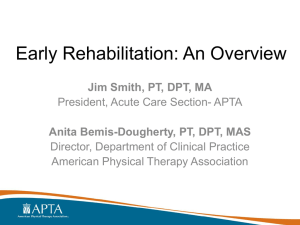Critical Care Rehabilitation Service
advertisement
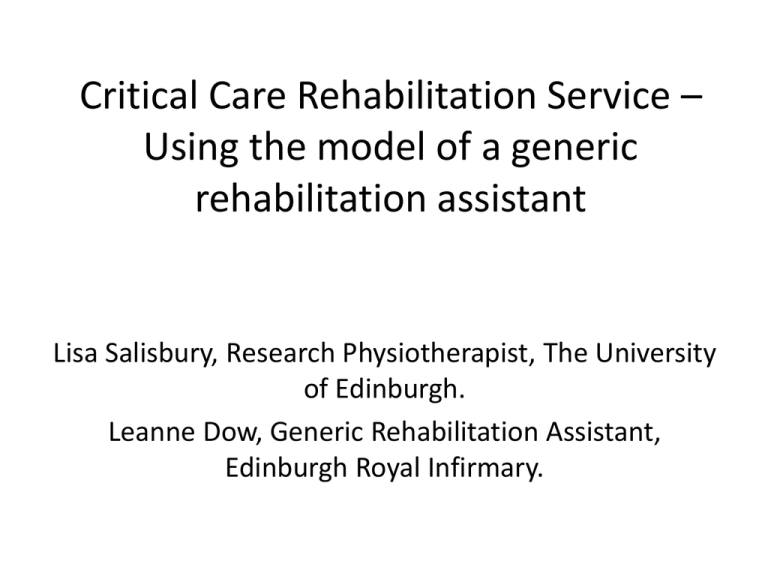
Critical Care Rehabilitation Service – Using the model of a generic rehabilitation assistant Lisa Salisbury, Research Physiotherapist, The University of Edinburgh. Leanne Dow, Generic Rehabilitation Assistant, Edinburgh Royal Infirmary. Content • Background to the rehabilitation service – RECOVER study • Generic Rehabilitation Assistant – Role – Challenges • Patient/Carer Feedback Evaluation of a Rehabilitation Complex Intervention for patients following Intensive Care Discharge. The RECOVER study Study Objectives Primary Objective To evaluate the impact on physical, psychological and social functioning of a novel strategy to enhance delivery of physical and nutritional rehabilitation to patients during the three months following ICU discharge. Secondary Objective To evaluate the cost-effectiveness of the novel approach. To compare patient and carer experiences between usual care and the new strategy. Inclusion and Exclusion criteria Inclusion Criteria • A patient requiring 48 hours continuous invasive mechanical ventilation in the intensive care unit (ICU) • Consultant declared patient ‘ward fit’ Exclusion Criteria • Primary neurological admission diagnosis (brain trauma; intracerebral bleed; stroke; Guillain-Barre syndrome) • The clinician in charge of care has agreed with the patient and/or family that only palliative care will be provided. • Patients currently receiving home ventilation or planning to commence a program of home ventilation • The patient is expected to be discharged from ICU to a non-study hospital where the intervention cannot be received • Gaining informed consent, following the intervention or follow-up is not feasible, despite resources available, due to communication difficulties • Patient currently enrolled in another RCT with similar endpoints • Patient aged <18 years at time of screening Randomised patients Group B Usual Care plus enhanced rehabilitation with generic rehabilitation assistant group Usual Care group Group A Stage of patient journey ICU discharge Ward based care Variable duration Hospital discharge Home (or post-hospital residence) Variable duration Outcome Assessments 3 months post randomisation Outcome Assessments 6 & 12 months post randomisation Stage in Patient Pathway Component of Rehabilitation Usual Care Group Stage 1: ICU discharge Intervention Group Visit by ICU staff member Structured discussion/explanation Provision of ICU recovery manual Provision of summary of ICU stay in lay language Introduction to generic rehabilitation assistant and explanation of rehabilitation strategy Within 1 week of ICU discharge according to individual patient characteristics Provision of ICU recovery manual Stage 2: Ward based rehabilitation Usual care pattern of multidisciplinary team input No involvement by generic rehabilitation assistant Weekly goal setting Daily visits from generic rehabilitation assistant to deliver agreed strategy to achieve goals Active problem identification and solving Around time of planned discharge Usual care pattern of discharge planning by parent teams ICU visit as determined by parent teams Planning with input from generic rehabilitation assistant to needs assessment Coordinated provision of critical illness specific information to GP and community based teams ICU visit prior to discharge Stage 4: Post Hospital discharge Usual care with no specific ICU based input Provision of generic rehabilitation assistant contact details to all patients At least one telephone contact within one week of discharge Other input according to individual patient preference Ongoing until hospital discharge Stage 3: Hospital discharge planning From hospital discharge to up to 3 months follow up point Outcome Measurement • Primary outcome measure – Rivermead Mobility Index • Secondary outcome measures – Battery of measures covering physical ability, nutritional status, quality of life • Measures taken at 3, 6 and 12 months • Focus groups with patients, carers and staff Progress so far • 240 patients recruited • 3 month follow-up completed and currently being analysed. • 6 and 12 month outcomes currently being collected. • Focus groups with patients, carers and staff have been carried out and are currently being analysed. Role of the Generic Rehabilitation Assistant • Provide assistance to qualified allied health professions – Dietetics – Physiotherapy – Occupational Therapy – Speech and Language Therapy • Social and general assistance • Case management Dietetics • Actions – Completed food record chart; calculated calorie and protein intake; check NG is insitu; monitored NG intake; ensured patients received and consumed supplements and snacks; assisted with feeding; encouraged patient at mealtime; monitored ileostomy output; weighed patients Physiotherapy • Mobility Treatments – Transfers; marching on the spot; walking; stairs; exercises; balance work; pedals; mobility advice; exercise bike; massage; PROM’s; stretches; pacing; ordering mobility equipment • Respiratory Treatments – ACBT; LTEE’s; manual techniques; IPPB; positioning; incentive spirometer; supported cough Occupational Therapy • Assessment – Collected background information and filled in pre-admission profile; assessment of mobility, transfers, washing/dressing, toileting/continence, feeding, self care, kitchen, domestic and cognitive/memory. • Interventions – Practice of washing/dressing, toileting, feeding, self-care, meal preparation; arranged package of care; provided aids and adaptations; home/environmental visits; liaised and/or assisted OT Speech and Language Therapy • Actions – Diet/fluid modification – check ward compliance; postural swallow strategies; swallow techniques/exercises; voice exercises/therapy; articulation exercises/therapy; language exercises/therapy; oral hygiene Social and General • Interventions – Visit off the ward – Visit to the intensive care unit – Discussion with patient – Discussion with family Case management • Single point of contact across all AHP’s, nursing and medicine. • Provide an advocacy role for patients and able to liaise across multiple health professionals. • Co-ordinated the lay summary, consultant visit and visit back to ICU • Psychological support Challenges! • Training programme and initial crisis of confidence • Gaining the trust of staff across multiple ward • Communication • Professional boundaries • Finding a ‘home’ Training • 4 week induction period – Background to critical illness – Discipline specific training (competency booklet) – Psychological Training • Initial training was at times overwhelming “there was everything in there in that first week and it was like information overload” “you’ve got so many things to take on board, you know you’re getting bombarded” Crisis of confidence • New role across multiple professions • Working at a Band 4 level • Research paperwork in addition to clinical workload “and I think I had a wee bit of a crisis of confidence in the start” “and they were extremely experienced which actually made me feel even more insecure” Gaining trust • New role – some initial resistance • Viewed as ‘research’ rather than part of the clinical team “we had a lot of negotiations to do with the qualified staff to get them on side” “ but the OT’s and Dietitians were quite reluctant to start with” “who are you and why are you here?” Communication • Multiple wards across 2 hospitals • Multiple staff groups including PT, DT, OT & SLT but also nurses, doctors, kitchen staff • Family “obviously I’ve had to adopt my higher level of communication because I’ve been communicating with a whole range of different professions, different levels of staff and I didnae know any of them” Professional Boundaries • Qualified staff questioned the ability/role of the GRA’s. “So it was only specific OT’s that kicked up about it, because I think they thought we were actually stepping on their toes as in doing their job” “but what we’ve actually developed now is that we’re asking if we can go and do, just help them get washed and dressed……. not in a ‘nursing’ capacity and not in an ‘OT’ capacity” Finding a home • Generic nature of the role • Research “Because it was research. It definitely seemed like that, it was, you weren’t part of the physio team, you weren’t part of the OT team, you weren’t part of the dietetics and you weren’t part of Speech and Language” “at the start not having a base and no actually being within a team was really stressful” “we were still made to feel like outsiders even in here, within the physio team” Summary • All initially were quite overwhelmed by the role/training, with time this reduced. • Issues around professional boundaries have also been worked out over time. • Communication was an essential skill necessary to overcome most of the barriers encountered during the study. Critical Care Rehabilitation Service • Only have funding for one GRA. • During trial 25% eligible patients received the intervention (2 GRA’s available). • Now 100% eligible patients are being identified by the service (only 1 GRA available). • Currently looking how to prioritise the resources that we have (Leanne) – challenge! • Embedding within current NHS services. Generic Rehabilitation Assistants “they were my lifesavers” “she was a good support” “ I would say when you’re a long term patient that you feel that there is someone there whom you can talk to and have a relationship with” Advocacy “if you had any worries you could talk to that one person and your worries got right to the source” “What I liked, was I think I will call Anna the Ambassador for me, she was my spokeswoman” “I found they always passed any problems onto ward staff and they took care of whatever was the problem” “But I think having one person assigned to you also, I thought that was marvellous you know there was that one person you knew you would see” “If you’re left with a sheet of paper to say do these exercises on a daily basis, I am not likely to be motivated but if somebody is there, physically there, saying do these, let’s do it together, its very different” Questions! ? Lisa.Salisbury@ed.ac.uk Leanne.Dow@nhslothian.scot.nhs.uk
